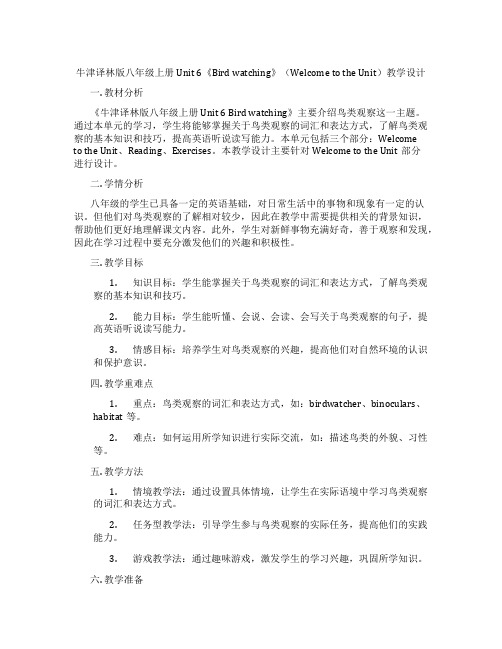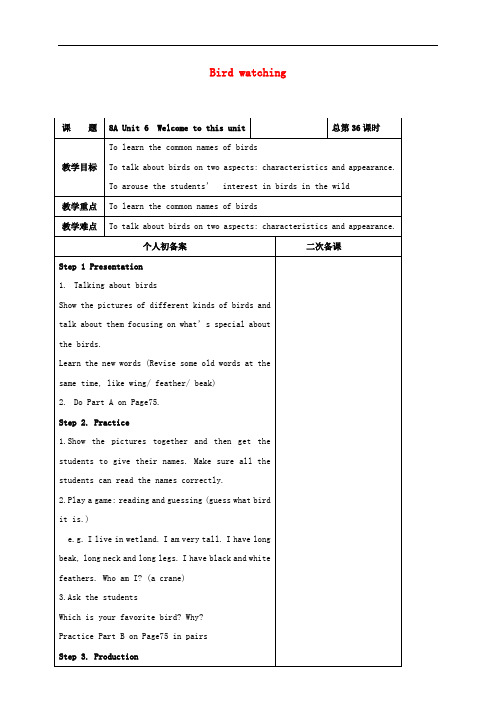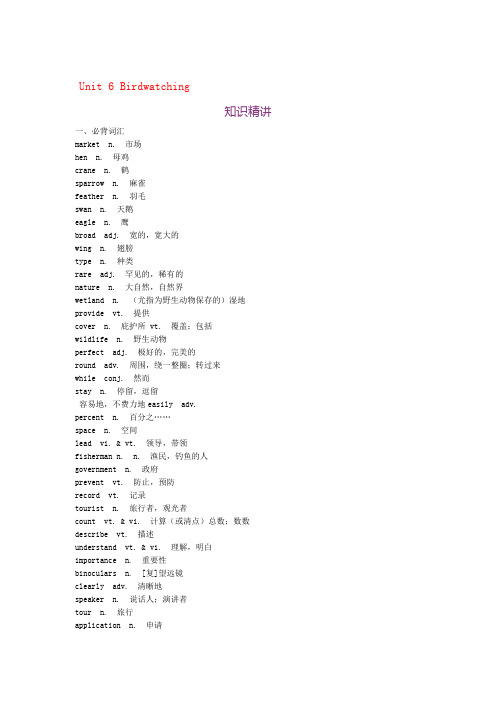江苏省涟水县大东中学八年级英语上册 Unit 6 Bird watching Task导学案
牛津译林版八年级上册Unit 6《Bird watching》(Welcome to the Uni

牛津译林版八年级上册Unit 6《Bird watching》(Welcome to the Unit)教学设计一. 教材分析《牛津译林版八年级上册Unit 6 Bird watching》主要介绍鸟类观察这一主题。
通过本单元的学习,学生将能够掌握关于鸟类观察的词汇和表达方式,了解鸟类观察的基本知识和技巧,提高英语听说读写能力。
本单元包括三个部分:Welcometo the Unit、Reading、Exercises。
本教学设计主要针对Welcome to the Unit部分进行设计。
二. 学情分析八年级的学生已具备一定的英语基础,对日常生活中的事物和现象有一定的认识。
但他们对鸟类观察的了解相对较少,因此在教学中需要提供相关的背景知识,帮助他们更好地理解课文内容。
此外,学生对新鲜事物充满好奇,善于观察和发现,因此在学习过程中要充分激发他们的兴趣和积极性。
三. 教学目标1.知识目标:学生能掌握关于鸟类观察的词汇和表达方式,了解鸟类观察的基本知识和技巧。
2.能力目标:学生能听懂、会说、会读、会写关于鸟类观察的句子,提高英语听说读写能力。
3.情感目标:培养学生对鸟类观察的兴趣,提高他们对自然环境的认识和保护意识。
四. 教学重难点1.重点:鸟类观察的词汇和表达方式,如:birdwatcher、binoculars、habitat等。
2.难点:如何运用所学知识进行实际交流,如:描述鸟类的外貌、习性等。
五. 教学方法1.情境教学法:通过设置具体情境,让学生在实际语境中学习鸟类观察的词汇和表达方式。
2.任务型教学法:引导学生参与鸟类观察的实际任务,提高他们的实践能力。
3.游戏教学法:通过趣味游戏,激发学生的学习兴趣,巩固所学知识。
六. 教学准备1.教材:《牛津译林版八年级上册》。
2.多媒体设备:电脑、投影仪、音响等。
3.教学素材:与鸟类观察相关的图片、视频等。
4.教学用具:黑板、粉笔、练习册等。
七. 教学过程1.导入(5分钟)利用投影仪展示一张美丽的鸟类图片,引导学生关注鸟类,激发他们的学习兴趣。
牛津译林版八年级上册Unit 6《Bird watching》(Task and self-asse

牛津译林版八年级上册Unit 6《Bird watching》(Task and self-assessment)教学设计一. 教材分析《Bird watching》是人教版牛津译林八年级上册的一篇文章,主要介绍了鸟类观察这一活动。
文章通过讲述作者和鸟类观察者们一起观察鸟类的过程,使学生了解鸟类观察的方法和技巧,以及观察鸟类给人们带来的乐趣。
本篇文章题材新颖,激发学生对鸟类观察的好奇心,提高学生对英语学习的兴趣。
同时,文章中涉及到的生词和短语也比较丰富,有助于学生扩大词汇量。
二. 学情分析八年级的学生已经具备了一定的英语基础,能够进行简单的听、说、读、写操作。
但是,学生在阅读理解方面还存在一定的困难,特别是对于长篇阅读材料的理解和分析能力。
此外,学生的词汇量有限,对于一些专业术语和生僻词汇可能不太熟悉。
因此,在教学过程中,需要帮助学生理解文章内容,引导学生运用所学知识进行思考和表达。
三. 教学目标1.知识目标:–能够理解文章主要内容,把握文章大意。
–学习并掌握文章中出现的生词和短语。
–了解鸟类观察的方法和技巧。
2.能力目标:–能够运用所学知识进行阅读理解,分析文章结构。
–能够运用所学词汇和句型进行口头表达和写作。
3.情感目标:–培养学生对大自然和生物的热爱,提高学生对英语学习的兴趣。
四. 教学重难点•理解文章主要内容,掌握文章大意。
•学习并掌握文章中出现的生词和短语。
•理解文章中关于鸟类观察的方法和技巧的描述。
•运用所学知识进行阅读理解和口头表达。
五. 教学方法1.任务型教学法:通过完成各种任务,引导学生积极参与课堂活动,提高学生的实践能力。
2.情境教学法:创设真实的情境,使学生在具体的情境中学习英语,提高学生的学习兴趣。
3.合作学习法:鼓励学生之间进行合作,共同完成学习任务,提高学生的团队协作能力。
六. 教学准备1.教师准备:–熟悉教材内容,明确教学目标。
–准备相关教学材料,如PPT、图片、视频等。
八年级英语上册 Unit 6 Bird watching Period 3 Reading 2练习

Unit6Reading2一。
根据中英文提示及解释,用正确形式填空。
1.There is not enough ______(空间) for you .2.Why is it important to protect the _______(湿地)?3.Many________(people who are travelling) e to visit Shanghai every year.4.After the flood came, people had to find new_______(place to live or a stay)5.Different _______(govern) take different ways to protect animals. 二.选择题1.They are changing the farmlands_____a supermarket.A. makingB. makeC. to makeD. made2. Fujian is_______the southeast of China.A. inB. atC. onD. to3. There are_____people on the earth ,but people have______space to live.A. fewer and fewer less and lessB. more and more fewer and fewerC. less and less fewer and fewerD. more and more less and less4. There____a number of books on the shelf. The number ofbooks______16.A. is … isB. are …areC. is… areD. are … is5. Betty is looking at us______. She looks very_______.A. happy … happyB. happy …happilyC. happily …happyD. happily …happily三.句型转换1.We have a sports meeting once. a year.(进行提问)_______ ___________do you have a sports meeting?2. I was late for school because my bike was broken on the road.提问___________ ____________you late for school?3. To learn English well is important. (同义句)_________ _____________important _____learn English well.4.My mother provided money for my uncle .(同义句)My mother _____ my uncle_______money.5.I have three books. My brother has two books.(改成含比较级的句子)My brother has ______books_____I.四,完形填空。
八年级英语上册 Unit 6 Bird watching Welcome to thi

e.g. I live in wetland. I am very tall. I have long beak, long neck and long legs. I have black and white feathers. Who am I? (a crane)
Learn the new words (Revise some old words at the same time, like wing/ feather/ beak)
2.Do Part A on Page75.
Step 2. Practice
1.Show the pictures together and then get the students to give their names. Make sure all the students can read the names correctly.
个ntation
1.Talking about birds
Show the pictures of different kinds of birds and talk about them focusing on what’s special about the birds.
4) The other ________ (wing) of the bird was hurt.
Step6 Homework
Write a short passage about your favorite bird (5-6sentences) .
板书设计
教学反思
2.Do some exercises.
苏教牛津译林版初中英语八年级上册 Unit 6《Bird watching》Grammar导学案-

苏教牛津译林初中英语重点知识精选掌握英语语法知识,巩固词汇量和各种语态,学好英语基础一定要扎实,大家一起练习吧!牛津译林初中英语和你一起共同进步学业有成!Bird watching活动一、课前预习导学(1)学习目标: 1. 学习不定式表示目的2. 学会带to的不定式和不带to的用法。
(2)课前预习 make sb do sth let sb do sthsee sb do sth hear sb do sthagree to do sth help sb do sthneed to do sth encourage sb to do sthadvise sb to do sth cause sb to do sth Task1根据课文内容填空.1. I go to the market ________( watch ) birds.2. we should tak e proper actions _____________( protect ) wildlife.3. I went to school ____________( look ) for my son.4. You can invite your partner __________( help ) us.5. Don’t make them _____________( wait ) for too long.6. Let me ___________( have ) a look at the picture.活动二、课堂合作探究1. 表示目的,后面的动词加to + 动词原形2. 不定式包括含有to 和不含to 的不定式。
动词后接宾语接带to的不定式的,例如:want (想要 ), would like , tell(告诉) , ask(命令) , teach(教) , agree(同意) , wish(希望), encourage (鼓励), advise ( 建议) 等。
Unit 6 Bird watching-【教材同步拓展阅读】八年级英语上册

2022-2023学年八年级英语上册单元话题拓展阅读Unit 6 Bird watching(牛津译林版)A阅读理解There are many national parks in Africa where you can go on safari(游猎). In the northeast of South Africa, there is a national park named Kruger National Park. It is about 20,000 square kilometers. Many kinds of plants and animals live in Kruger, including the famous "Big Five". For hunters, these five animals are some of the most difficult and dangerous to catch. Many travelers think mainly about seeing the Big Five while on safari. But there are many other interesting, and much smaller animals too.Tanzania(坦桑尼亚) is another country with many parks where you can go on safari. The good place is Gombe Stream National Park in the west of the country. It has thick forest, old trees, and beautiful lakes. When you go deep into the forest, you can sit to wait for some animals to come near. You'll be glad to watch these animals playing, eating and communicating(交流) with each other.Chobe National Park in the country Botswana is another popular place for safari. You can see one of the largest elephant groups in the world there. You can see elephants face to face in this national park. When you go around the park and feel the grass moving, there may be elephants. Then you can see them nearer. They walk past you to look for food.(1)If you go to the north—east of South Africa, the best place to go on safari is_______.A.Chobe National Park B.Gombe Stream National ParkC.Tan.D.Kruger National Park(2)What does “the Big Five” mean in the passage?A.They are five big parks.B.They are five kinds of big and dangerous animals.C.They are five good hunters.D.They are five high mountains.(3)How many countries does the writer mention(提到) in the passage?A.One.B.Two.C.Three.D.Four.(4)Which of the following is NOT true?A.Gombe Stream National Park is a good place with thick forest and beautiful lakes.B.Gombe Stream National Park i.s one of the parks where you can go on safari in Tanzania.C.Chobe National Park has many elephants.D.You can see interesting small animals around the lake in Chobe National Park.(5)Which is the best title?A.Safari in Africa B.Face to Face with the ElephantsC.Travelling in Africa D.Animals in AfricaB根据短文内容选择正确答案。
八年级英语上册unit6 bird watching词汇与语法基础训练新版牛津版

Unit 6 Birdwatching知识精讲一、必背词汇market n. 市场hen n. 母鸡crane n. 鹤sparrow n. 麻雀feather n. 羽毛swan n. 天鹅eagle n. 鹰broad adj. 宽的,宽大的wing n. 翅膀type n. 种类rare adj. 罕见的,稀有的nature n. 大自然,自然界wetland n. (尤指为野生动物保存的)湿地provide vt. 提供cover n. 庇护所 vt. 覆盖;包括wildlife n. 野生动物perfect adj. 极好的,完美的round adv. 周围,绕一整圈;转过来while conj. 然而stay n. 停留,逗留容易地,不费力地easily adv.percent n. 百分之……space n. 空间lead vi. & vt. 领导,带领fisherman n. n. 渔民,钓鱼的人government n. 政府prevent vt. 防止,预防record vt. 记录tourist n. 旅行者,观光者count vt. & vi. 计算(或清点)总数;数数describe vt. 描述understand vt. & vi. 理解,明白importance n. 重要性binoculars n. [复]望远镜clearly adv. 清晰地speaker n. 说话人;演讲者tour n. 旅行application n. 申请form n. 表格;形式address n. 地址chairperson n. 主席introduce vt. 介绍natural adj. 自然的,天然的society n. 协会;社会观鸟bird-watching n.改变,变化change n.二、重点词汇1. lead verb /li?d/1).v. to control a group of people, a country, or a situation领导,带领,率领例句:I've asked Gemma to lead the discussion.我已请杰玛组织大家讨论。
牛津译林版八年级上册Unit 6《Bird watching》(Study skills)教学设计

牛津译林版八年级上册Unit 6《Bird watching》(Study skills)教学设计一. 教材分析《牛津译林版八年级上册Unit 6 Bird watching》主要介绍了鸟类观察这一主题。
通过本节课的学习,学生将能够掌握与鸟类观察相关的词汇和表达方式,提高听说读写的能力。
教材内容丰富,插图精美,激发了学生学习英语的兴趣。
本节课的教学内容与学生的日常生活紧密相连,有利于他们在实际生活中运用所学知识。
二. 学情分析八年级的学生已经具备了一定的英语基础,对于动物主题的课文较感兴趣。
但部分学生在英语学习中存在发音不准确、词汇量不足、语法掌握不牢固等问题。
因此,在教学过程中,需要关注学生的个体差异,因材施教,提高他们的英语素养。
三. 教学目标1.知识目标:学生能够掌握与鸟类观察相关的词汇和表达方式,理解课文内容。
2.能力目标:学生能够在实际情境中运用所学知识进行交流,提高听说读写的能力。
3.情感目标:培养学生热爱大自然、关注生态环境的意识。
四. 教学重难点1.重点:学生能够掌握与鸟类观察相关的词汇和表达方式。
2.难点:学生能够在实际情境中运用所学知识进行交流。
五. 教学方法1.情境教学法:通过设定鸟类观察的场景,让学生在实际情境中学习英语。
2.任务型教学法:通过完成观察鸟类的任务,提高学生的英语实践能力。
3.小组合作学习:鼓励学生分组讨论,培养团队合作精神。
六. 教学准备1.教师准备:提前熟悉教材内容,了解学生的学习状况。
2.学生准备:预习课文,了解鸟类观察的基本知识。
3.教学资源:准备与鸟类相关的图片、视频等教学素材。
七. 教学过程1.导入(5分钟)教师通过展示鸟类观察的图片,引导学生谈论自己最喜欢的鸟类,激发学生的学习兴趣。
2.呈现(10分钟)教师播放教材中的视频,让学生了解鸟类观察的基本知识。
随后,教师呈现课文标题和图片,引导学生预测课文内容。
3.操练(10分钟)教师引导学生跟读课文,纠正发音。
- 1、下载文档前请自行甄别文档内容的完整性,平台不提供额外的编辑、内容补充、找答案等附加服务。
- 2、"仅部分预览"的文档,不可在线预览部分如存在完整性等问题,可反馈申请退款(可完整预览的文档不适用该条件!)。
- 3、如文档侵犯您的权益,请联系客服反馈,我们会尽快为您处理(人工客服工作时间:9:00-18:30)。
Unit 6 Bird watching Task 一、Teaching aims:
1 如何写一封申请信。
2 如何填写申请表。
3 会写申请信。
4 热爱自然,保护野生生物。
二.Knowledge to prepare:
1、回顾写一封正式英文信函的格式
name and title of receiver
-address of receiver greeting
2、找出本课的重要句型: 三.Teaching contents:
1、The Birdwatching Club organizes a lot of interesting activi ties to protect birds and help
2、people know more about birds, for examp le, birdwatching, birdcounting, etc. They sound fun. Would you like to join the club?
address of sender and the postcode
3、、If you do, you will have to fill in the application form(申请表) on Page 89. (要求书写工整,不得随意涂改。
填写完,小组内互相检查。
)
4、If you want to join the Birdwatching Club, it is not enough to fill in the form. The club als o asks for an application letter(申请信). Read Amy’s letter to the chairperson. Read the letter quickly and answer the questions.
(1)Who is the chairperson of the club?
(2)How did Amy get interested in the club?
(3)What are Amy’s favourite subject?
(4 )What are her hobbies and interests?
(5)Why does she want to become a birdwatcher?
5、Read the letter one paragraph by one then think about the main idea of each paragraph.
Para. 1:
Para. 2:
Para.3:
Para.4:
6、Writing
You also want to join the Birdwatching Club. Use Amy’s letter as a model. Replace the underlined words with your own information. Then read your letter in your group.
四.Knowledge carding
1、帮助总结申请表(application form)的填写。
2、总结申请信的一些问题即与习题中的第五项中的5个问题
五、Compliance testing:
一)、选择填空
( )1. They couldn’t play football because all of them forgot __ a football this afternoon.
A. bringing
B. bring
C. brought
D. to bring ( )2. How ___ you ____ to school tomorrow?
A. do, coming
B. are, coming
C. are, come
D. do, come ( )3. I ______buy the recorder because I had no money with me then.
A. can
B. can not
C. could
D. couldn’t
( )4. Listen! Can you hear someone _________?
A. whisper
B. to whisper
C. whispering
D. whispered
( )5. Wood catches fire easily. So ______fire.
A. keep it away from
B. don’t keep it away from
C. keep it away
D. don’t keep it away
二)、用所给单词的适当形式填空
1. He is quite ______ (think) and thinks __________ (care) when he works.
2. What will he do when he _____________(lose) his way in a strange place?
3. He ______________ (plan) everything well just now.
4. Don’t you think he is very __________ (help)?
5. I hear he was ill. Is he feeling ____________ (well) now?
6. The swimmin g pool __________________ (not open) on Monday.
7. Tom and his friend are___________(member) of the Helping Hands Club.
8. We are going to visit a home for the__________(elder) this Sunday.
9. Thank you for _______________ (collect) so much information for me.
10. When I turned around I saw him _____________ (across) the street.
11. You’d better______________(not go)outside. It’s too late.
12. They’re __________________(worry) about their children。
